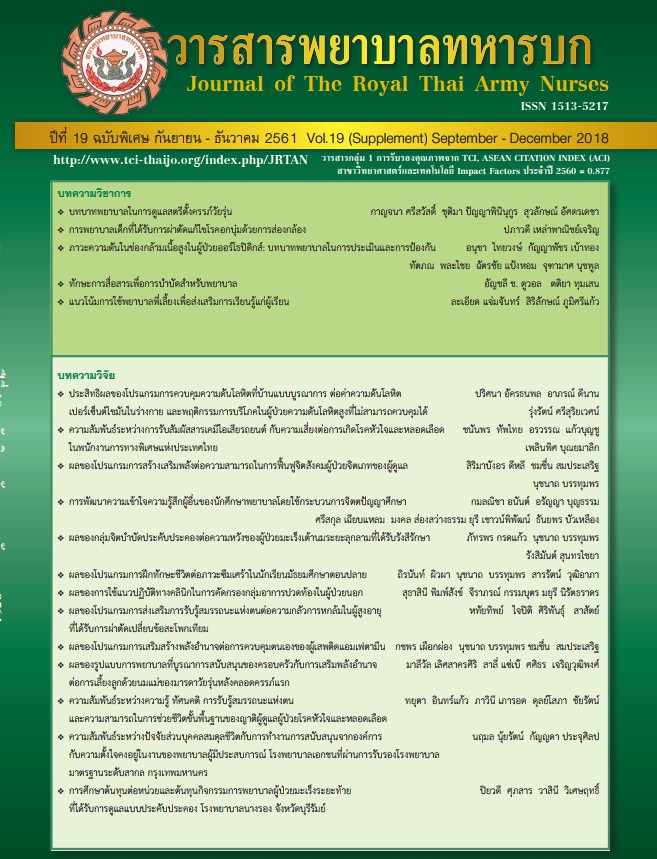An Effect of Using a Program for Developing Nursing Diagnosis Capabilities of Professional Nurses
Keywords:
Development program, Nursing diagnosisAbstract
This study was a quasi-experimental research. Its objectives were 1) to study nursing diagnosis capabilities of professional nurses of a governmental hospital before and after using a program for developing their nursing diagnosis capabilities, and 2) to compare their nursing diagnosis capabilities before and after using the program. The sample comprised 15 nurses who worked for three medical wards of the hospital. They were selected by purposive sampling. There were 2 research tools: 1) the program for developing nursing diagnosis capabilities of professional nurses, and 2) a modified essay question for assessing their nursing diagnosis capabilities. The second tool was done for validity and reliability. It reliability was 0.94. Data were analyzed by mean, standard deviation and Wilcoxon signed ranks test. 14 The research findings were as followed. 1) The overall mean score and the itemized scores which were classified by nursing diagnosis steps, scenario, their age group, and their medical work experiences before using the program were totally at the low level; whereas after applying the program, they were entirely at the high level. 2) Their nursing diagnosis capabilities regarding the overall and the itemized scores with divided by nursing diagnosis steps and scenario after using the program were all significantly higher than before using the program at the level 0.05
Downloads
References
2. Xianghen L. Professional competence analysis in nursing diagnosis. (Master of Education Thesis). Bangkok: Chulalongkorn University; 1987. (in Thai)
3. Rasamemala R. Professional nursing competency analysis in neonatal nursing diagnosis. (Master of Education Thesis). Bangkok: Chulalongkorn University; 1991. (in Thai)
4. Hasegawa T. Measuring Diagnostic Competency and the Analysis of Factors Influencing Competency Using Written Case Studies. [abstract].International Journal of Nursing Terminologies and Classifications. (On line) 2007.June
5. Suksiri N. Nursing process ability in nursing in Rayong hospital. (Master of Nursing Science). Chonburi: Burapha University; 2001. (in Thai)
6. Tunmukayakul O. Perception of nursing Principle of Nurses in Thailand. Journal of Nursing Science. 2010; Vol.25: No. 1 Pages: 27-37. (in Thai)
7. Piyakong D. Nursing diagnosis: the ability and attitudes of nursing students in colleges to use and not use nursing diagnosis form Of North American Nursing Association. (Master of Education Thesis). Bangkok: Mahidol University.; 1996. (in Thai)
8. Sinasouthi R, Krikkulthorn T. Attitude and ability of nursing diagnosis of nursing students. Boromarajonani College of Nursing. Master Degree). Saraburi: Boromarajonani College of Nursing; 2000. (in Thai)
9. Srimorakot P. Nursing Care for Adults and the Elderly with Health Problems Volume 2. Bangkok: AI Group Press; 2010 (in Thai)
10. LeFevre A. Applying Nursing Process: Promoting Collaborative Care. Philadelphia: J.B. Lippincott; 2002.
11. Harnyoot O. Nursing Process and Implications. Journal of The Royal Thai Army Nurses. 2014; 15 (3): 137-143 (in Thai)
12. kammanee T. Teaching Technique: Knowledge for Effective Learning Process. (15th ed.). Bangkok: Chulalongkorn University Press; 2012. (in Thai)
13. Markus B. Learning Pyramids. WSVA 1 Virtual Academy and the Surveying/Geoinformatics Community Virtual Academy I; 2005.
14. srirugsa K. Modified Essay Question. Khonkaen Medical. 2011; No. 1 Vol. 35 : 5-7
15. Srisatitnarakul B. Research Methodology in Nursing. (5thed.). Bangkok: U & I Inter Media Co., Ltd; 2010.
16. Srisaart B. Statistical methods for research 1. (5th ed.). Bangkok: Suvieeriyasaan Thailand; 2013. (in Thai)
17. Scott, W.A. Reliability of content analysis: the case of nominal scale coding. Public Opinion Quarterly. 1955; XIX: 321-325.
18. Kannasot P. A study of behavioral science research. Bangkok: Chulalongkorn University; 1999. (in Thai)
19. Carlson, H. and other. Nursing Diagnosis. New York: W.B Saunders Company; 1982.
Downloads
Published
How to Cite
Issue
Section
License
บทความหรือข้อคิดเห็นใดใดที่ปรากฏในวารสารพยาบาลทหารบกเป็นวรรณกรรมของผู้เขียน ซึ่งบรรณาธิการหรือสมาคมพยาบาลทหารบก ไม่จำเป็นต้องเห็นด้วย
บทความที่ได้รับการตีพิมพ์เป็นลิขสิทธิ์ของวารสารพยาบาลทหารบก
The ideas and opinions expressed in the Journal of The Royal Thai Army Nurses are those of the authors and not necessarily those
of the editor or Royal Thai Army Nurses Association.






